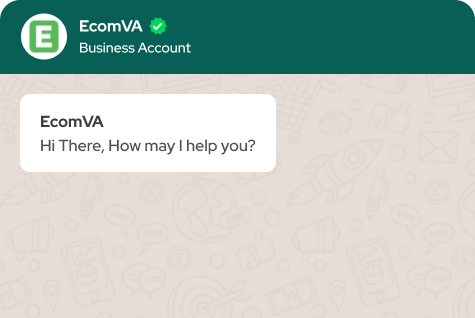How E-Commerce Personal Assistant help your E-Commerce Store
Once you get an e-commerce personal assistant, it becomes effortless to handle multiple tasks and meet the targets with industry experts. Having access to great resources and experience in the market, they are capable of handling all the requirements of your e-commerce store hassle-free.
An e-commerce personal assistant can provide significant support and value to your e-commerce store operations, helping you streamline processes, improve customer experiences, and ultimately grow your business.
Here’s how an e-commerce personal assistant can help:
Order Management
An e-commerce personal assistant can handle order processing, tracking, and fulfillment, ensuring that customer orders are accurately and efficiently managed.
Inventory Management
Keeping track of inventory levels, restocking products, and managing stock outs can be time-consuming. An assistant can help you monitor inventory levels and ensure products are available when customers want to purchase them.
Customer Support
An e-commerce personal assistant can assist with customer inquiries, resolve issues, and provide timely responses through various communication channels, enhancing customer satisfaction.
Data Entry and Management
An assistant can handle data entry tasks, updating product listings, prices, and descriptions on your e-commerce platform. This ensures that your product information is accurate and up-to-date.
Product Research
Whether you’re looking to expand your product range or find new suppliers, an assistant can conduct research to identify potential products that align with your target market and business goals.
Market Research
Stay competitive by having your assistant conduct market research, monitor industry trends, analyze competitors, and identify growth opportunities.
Content Creation
Assistants can help create and schedule content for your e-commerce website, social media platforms, and marketing campaigns, ensuring consistent branding and engagement with your audience.
Email Marketing
An assistant can manage your email marketing campaigns, from designing templates to scheduling and analyzing results, helping you stay connected with your customer base.
Analytics and Reporting
Your assistant can gather and analyze data related to website traffic, sales, and customer behavior, providing insights that can guide your business strategies.
Customer Engagement
Engage with customers through personalized messages, follow-ups, and special offers to foster customer loyalty and repeat business.
Administrative Tasks
An e-commerce personal assistant can handle administrative tasks such as scheduling, calendar management, and organizing meetings, allowing you to focus on higher-priority tasks.
Outreach and Partnerships
If you’re seeking collaborations or partnerships, an assistant can research and initiate contact with potential partners, influencers, or affiliates.
Quality Assurance
Ensure that your website is functioning properly by having your assistant conduct regular checks, testing links, and verifying that the checkout process works seamlessly.
Feedback and Improvement
An assistant can help gather customer feedback, reviews, and ratings, providing valuable insights for enhancing your products and services.
Time Savings
By delegating routine and time-consuming tasks to your assistant, you can focus on strategic decisions and growing your business.
When hiring or working with an e-commerce personal assistant, it’s important to clearly define their role and responsibilities, provide proper training and guidance, and establish effective communication channels. This way, you can maximize the benefits of having a capable assistant supporting your e-commerce store operations.
What are the different types of e-commerce personal assistants available?
1. Freelance e-commerce Personal Assistants
Freelancers are independent contractors offering their services directly to businesses. They provide flexibility in terms of project scope and scheduling.
They often charge lower upfront costs and provide customizable service packages tailored to your needs.
2. E-commerce Personal Assistant Agencies
These are established agencies specializing in e-commerce support. They handle the recruitment, vetting, and management of VAs, offering a wider talent pool.
You get access to a pre-screened pool of qualified VAs and a streamlined onboarding process, and the agency takes care of administrative tasks.
3. Virtual Assistant Teams
These are the companies offering a team of virtual assistants with diverse skill sets, often including e-commerce expertise.
You get access to a broader range of skills beyond just e-commerce tasks and the potential for project scalability as your needs evolve.
However, they may require clearer communication channels to ensure tasks are delegated effectively within the team. Also, pricing structures might be based on team size rather than individual needs.
Key qualities to look for when hiring an e-commerce personal assistant
1. E-commerce Expertise
- In-depth knowledge of e-commerce platforms: Familiarity with leading platforms like Shopify, WooCommerce, or BigCommerce allows the VA to navigate tasks seamlessly, minimizing onboarding time.
- Understanding of e-commerce best practices: Look for a VA who possesses knowledge of product listing optimization, order fulfillment processes, and customer service strategies specific to the e-commerce landscape.
- Awareness of current e-commerce trends: A VA who stays updated on industry trends like social commerce or mobile shopping habits can bring valuable insights and keep your business competitive.
2. Organizational Skills and Time Management
- Excellent task prioritization: The ability to manage multiple tasks efficiently and prioritize based on urgency is essential for keeping online stores running smoothly.
- Meticulous attention to detail: Accuracy is paramount in e-commerce. A VA with a keen eye for detail ensures tasks are completed flawlessly, from order processing to inventory management.
- Strong time management: Meeting deadlines and maintaining a productive workflow are crucial for a VA. Look for someone who can manage their time effectively and consistently deliver results.
3. Communication and Customer Service
- Clear communication: The ability to communicate effectively, both written and verbal, is necessary for successful collaboration with you and the business owner.
- Professional written communication: Error-free writing skills are important for tasks like email marketing or crafting product descriptions.
- Excellent customer service skills: The VA might be the first point of contact for customer inquiries. Look for someone with a friendly, professional demeanor who can effectively resolve customer issues.
4. Initiative and Adaptability
- Proactive problem-solving: A VA who can identify potential issues and take the initiative to find solutions demonstrates valuable resourcefulness.
- Ability to learn new things quickly: The e-commerce landscape is constantly evolving. A VA who is adaptable and eager to learn new skills ensures they can stay current with industry changes.
- Willingness to go the extra mile: A genuine enthusiasm for e-commerce and a dedication to exceeding expectations are qualities that set a stellar VA apart.
How do you effectively onboard and train your e-commerce personal assistant?
1. Pre-Boarding Preparation
- Gather Information: Before the first day, collect details from the client business about their specific e-commerce platform, product range, target audience, and brand voice.
- Develop a Customized Training Plan: Tailor the training program to the VA’s skill set and the client’s specific needs. This ensures focused learning that directly benefits the business.
- Provide Essential Resources: Equip the VA with access to relevant resources like platform tutorials, brand style guides, and internal knowledge bases before their start date.
2. Warm Welcome and Introduction
- Personalized Welcome: Start by creating a welcoming environment. Introduce the VA to the team, answer any initial questions, and express your agency’s support.
- Client Introduction & Expectations: Facilitate a virtual meeting between the VA and the client business. This allows for clear communication of expectations, working styles, and preferred communication channels.
- Platform and Tool Training: Provide comprehensive training on the specific e-commerce platform the client uses (Shopify, WooCommerce, etc.) and any additional tools required for their tasks.
3. In-Depth Knowledge Transfer
- Product Knowledge & Inventory Management: Ensure the VA thoroughly understands the client’s product range, pricing strategies, and inventory management procedures.
- Order Fulfillment Process: Train the VA on the client’s order fulfillment process, including order processing, shipping procedures, and customer communication protocols.
- Customer Service Training: Equip the VA with the skills to handle customer inquiries effectively, including troubleshooting common issues and adhering to the client’s customer service policies.
The Benefits of Effective Onboarding
Investing in a thorough onboarding and training process for your VAs yields several benefits:
- Increased Client Satisfaction: Well-trained VAs can deliver exceptional service to client businesses, fostering long-term partnerships.
- Reduced Errors and Improved Efficiency: Clear training minimizes errors and ensures the VA operates efficiently, saving time and resources for both the client and your agency.
- Enhanced VA Confidence: Investing in their development empowers VAs with the knowledge and skills they need to succeed, boosting their confidence and job satisfaction.
We have given you multiple reasons to invest in an e-commerce personal assistant. Having quality resources that require minimal effort makes it easier to scale business and generate better returns.




